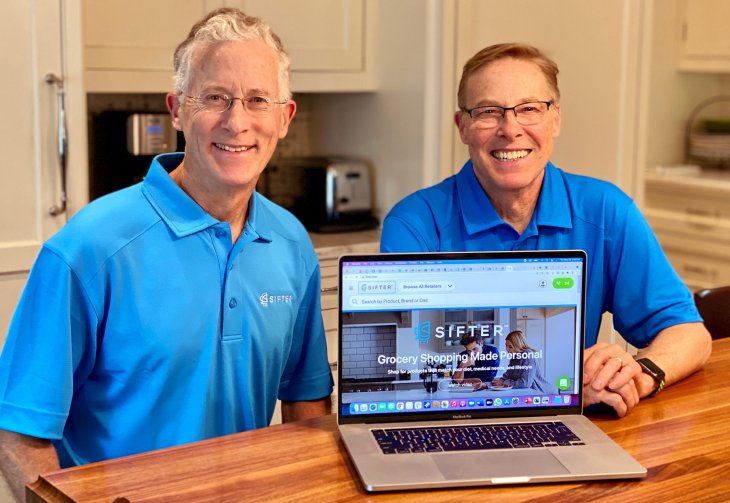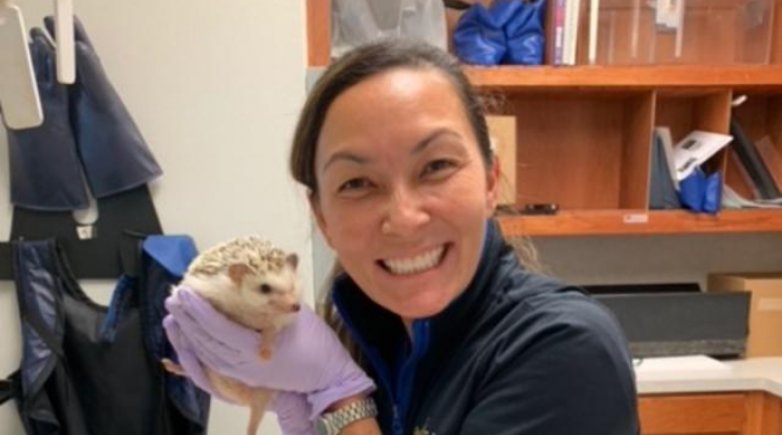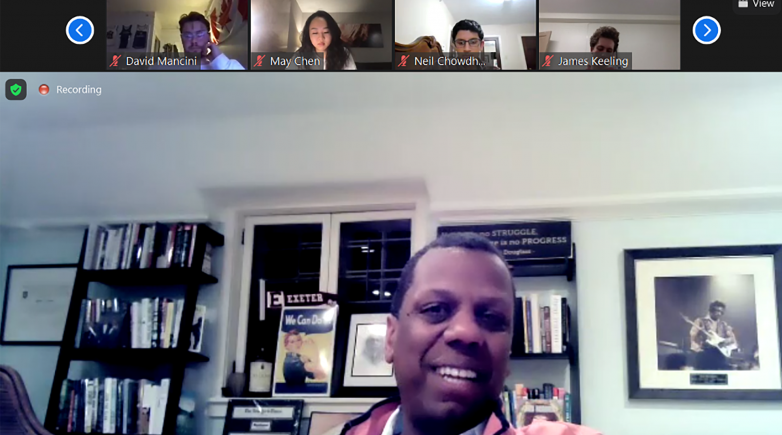Andrew ’76 and Thomas Parkinson ’78

“We follow a ‘fail fast, continuously improve’ development process.”
Serial entrepreneurs Andrew ’76 and Thomas Parkinson ’78 have a knack for identifying sales opportunities. They started young: At age 8, Thomas tried (unsuccessfully) peddling dirt; Andrew operated a lemonade stand. They raised chickens to sell fresh eggs to neighbors on Long Island. “We didn’t receive an allowance so we were hungry to make money,” Thomas says.
After years of working in and around the consumer goods industry, the brothers came up with the big idea that would change their lives — online grocery shopping. In 1989, that idea took root and grew into Peapod, the first online grocery delivery service. Now owned by Netherlands-based Ahold Delhaize NV, Peapod accounts for more than $1 billion in online grocery revenue in the United States.
Last year, the Parkinsons launched a new endeavor: Sifter, a free online platform that helps users sort and buy grocery products based on health and dietary needs. Aimed at addressing what they consider “an American health and wellness epidemic,” Sifter is just the latest in a series of “firsts” that the brothers have achieved throughout their careers.
A strong work ethic
Growing up in a family of six, the Parkinsons were accustomed to working hard. “Our parents insisted that we work to get our spending money,” Andrew says. That work ethic extended to the brothers’ tenure at Exeter. In addition to classes and playing sports such as hockey and lacrosse, Andrew delivered the Sunday New York Times on campus; Thomas worked in Wetherell Dining Hall and later became head of the student work office. Prep year math introduced them both to the BASIC computer programming language, knowledge that served them well when they started Peapod. “We learned how to program and it was an early opportunity to demystify computers,” Thomas says.
As students at Wesleyan University, the brothers discovered that their skills complemented each other’s. Combined, they decided, they could run a successful business. They founded Parkinson Products, Inc., inventing the Keg Karrier, a device for carrying beer kegs, and selling custom T-shirts. They even attempted to peddle “Pure Canned Nuclear Waste,” a tongue-in-cheek product inspired by the Pet Rock craze. “It was a failure,” Thomas says. “We tried to sell it on the streets of New York City and people ran away from us.”
The brothers parted briefly professionally after college. Andrew, an economics major, worked in brand management for consumer goods giant Procter & Gamble and, later, Kraft Foods. “I originally worked on the Pringles brand where I learned how to create budgets and run a business,” he says. Thomas, who majored in art and pursued a master’s degree in industrial design at Pratt Institute in New York City, also briefly worked for Procter & Gamble. He discovered an aptitude for computers and information technology working in his brother-in-law’s executive-search software business, where they created one of the first resume search engines.
During a year off competing with the U.S. Boardsailing Team (both brothers have used kiteboarding or windsurfing throughout their lives to decompress), Andrew developed a business plan based on a compelling statistic he learned at Kraft: 70% of consumers didn’t like shopping for groceries. “I was struck by how much consumer product companies were spending on advertising,” Andrew says. “Thomas and I thought if we could give people a way to shop for groceries from home while looking at their home computer screen, we could make money by targeting ads on the computer at the point of purchase. It was initially about creating a media platform by providing a convenient useful service to consumers.” (The brothers also asked their mother, a former librarian, whether it made more sense to launch an online bookseller; she told them the sales margins on books were too low so they opted for groceries instead. The brothers still don’t let their mom forget that decision.)
Peapod takes root
Armed with a homemade data center (a Crate & Barrel wine rack containing dial-up modems), DOS programming software and floppy disks, the Parkinsons founded Peapod in 1989. “We originally called the business IPOD (for Information and Product on Demand),” Andrew says. “We got our business cards and I said, ‘That’s a stupid name’,” Thomas says, laughing. “‘How about Peapod?’”
Initially a family operation, the Parkinsons and their wives ran every aspect of the company. They wrote the software code that allowed customers to place their orders via computer, plucked items from local grocery store shelves to fulfill those orders, and even drove the trucks that delivered orders right to customers’ homes. Over the next 12 years, Peapod expanded from Chicago to 23 other U.S. cities. After taking the company public in 1997, the Parkinsons, who continued to run the company, partnered with supermarkets like Kroger, Safeway and Stop & Shop, hiring shop- pers to pick customer orders off store shelves. When that became cost-prohibitive, they shifted to a warehouse model, stocking their own products. Then came the dot-com bust in 2000 and a need for financing. The brothers sold 51 percent of Peapod ownership to Ahold; Andrew stayed on as president while Thomas remained chief technology officer.
Through it all, they continued to innovate, developing many firsts, including online coupons; the technology that enables shoppers to sort groceries according to nutritional needs; and mobile solutions like a free Peapod smartphone and tablet app. In 2009, the Parkinsons founded a product content company, ItemMaster (now Syndigo), which pulled together grocery product data to help shoppers make informed buying decisions.
“We became online grocery and grocery product data experts,” Thomas says. “Capturing all that information enabled us to be able to tell people where to buy products and what was in them.”
Sifting through a new opportunity
Andrew left Peapod after 26 years in 2015; Thomas followed in 2019. Not content to rest on their laurels, the brothers began to consider new ways to harness their knowledge of product data and technology for good. “We saw an opportunity to address the growing health crisis in the U.S. by helping people find food that fits their dietary, medical and lifestyle priorities,” Andrew says. “We felt obligated to use the knowledge we acquired running Peapod and ItemMaster to pursue a ‘food as medicine’ strategy to help people with their health.”
In 2020, the brothers launched Sifter.shop, a service that identifies products based on an individual’s dietary criteria and excludes products with ingredients that might conflict with a person’s allergies or medications. The Sifter algorithm analyzes each product’s ingredients and categorizes them based on various dietary concerns.
Consumers can also develop diet plans and use a function called RecipeSifter to “sift” a recipe, showing ingredient options, sorting diet preferences and recommending products that can be added to the shopper’s cart. “While only in the market since February of this year, we’re very pleased to be getting very positive feedback from consumers about Sifter and how it’s helping them,” Andrew says.
But that is far from the end of the story. The brothers continue to develop functionality for Sifter that will progressively improve the platform and which, they hope, will have a positive impact on global health. “We follow a ‘fail fast, continuously improve’ development process and we’re driven by a quote I found a long time ago by Winston Churchill,” Andrew says. “‘I would rather try and fail a thousand times than dwell in the twilight that knows neither victory or defeat.’”
Seems that staying hungry has paid off.
This article first appeared in the summer 2021 issue of The Exeter Bulletin.


